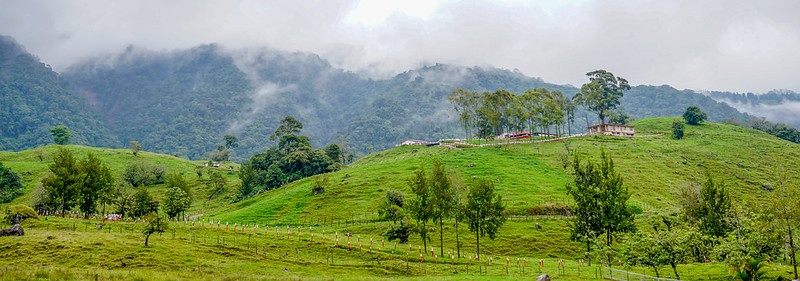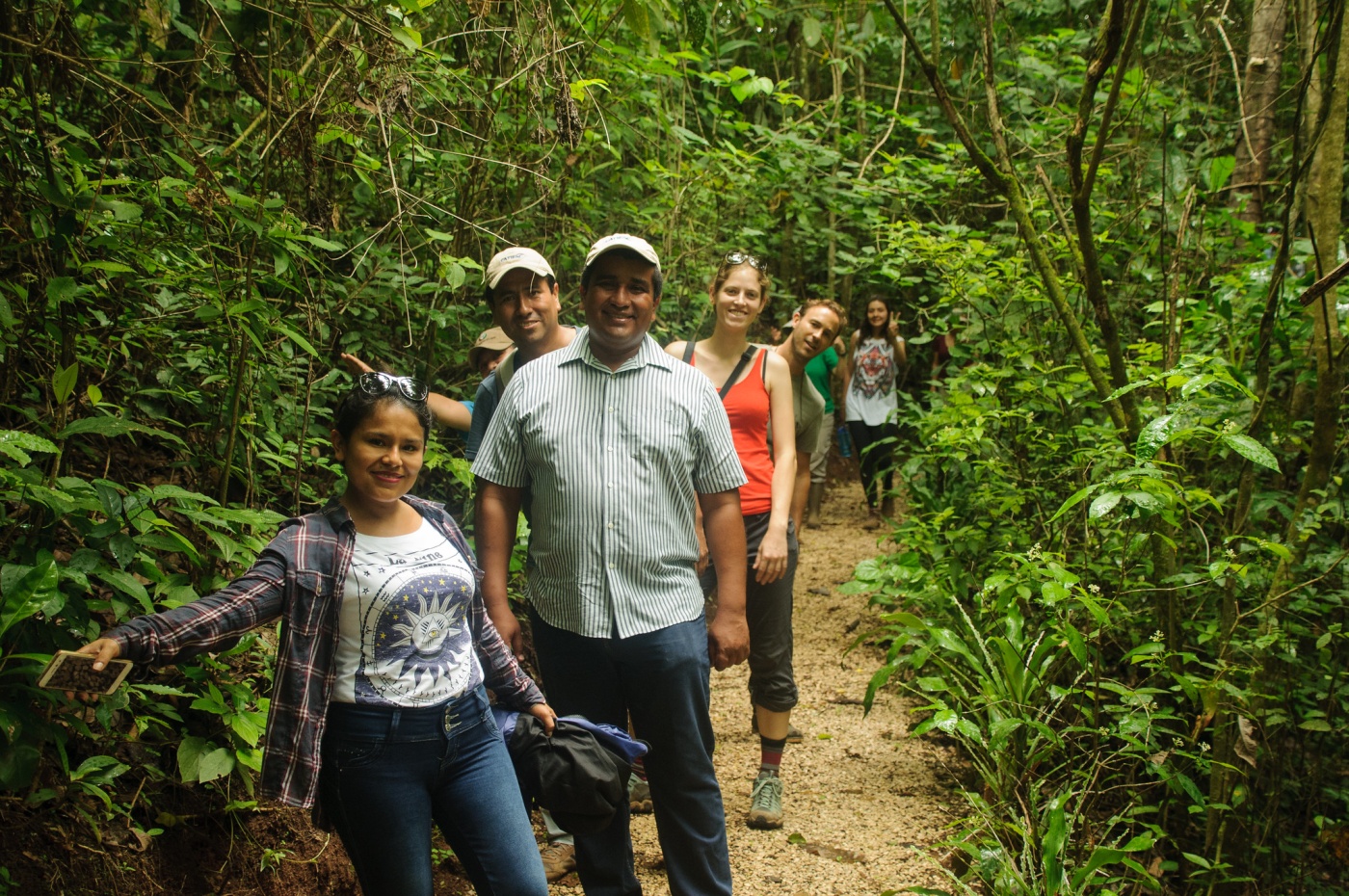Between August and September 2025, a series of webinars entitled "Gender and social equity in restoration: reflections from Initiative 20x20 " was held, consisting of four virtual meetings with the aim of building the conceptual and participatory foundations of the new Gender and Social Equity (GSE) pillar of the Initiative.
These spaces brought together representatives from governments, community organizations, research centers, international agencies, and financial actors from twelve countries in Latin America and the Caribbean to strengthen knowledge and collective action on how to integrate a gender perspective into landscape restoration processes. Specifically, the aim is to collaboratively promote gender-sensitive public policies and scale up inclusive practices in technical, political, and financial terms, while strengthening the transformative participation of women, youth, and indigenous peoples in restoration.
For this reason, the webinars were designed using a participatory, inclusive, and multilingual methodology, with simultaneous translation in Spanish, Portuguese, and English, combining keynote presentations with spaces for collective reflection. In total, 14 speakers from 12 partner organizations shared experiences that illustrate the challenges, lessons learned, and progress toward more inclusive restoration.
This initiative was developed under the leadership of WRI Global and with the support of WRI Colombia, Wise Women Chile, EcoAgriculture Partners, and the Latin American Model Forest Network. Each session brought together more than 40 live participants and reached more than 200 people who registered for the recorded versions.
Below is a summary of each session in this series:
Access the webinar recordings here:
Gender and Social Equity in Restoration: Key Concepts (original room). Access code: t2r.^rLa . Portuguese audio.
Gender barriers in restoration: Intersectional analysis from the 20x20 Initiative. Access code: 1!N5eVi^ . Portuguese recording. Spanish audio. English recording.
Strategies for inclusion: moving towards transformation in restoration. Access code: &b8g^PQq. Recording in Portuguese.
Tools Fair: Sharing advances for inclusion in restoration. Access code: dH$Pzp17
Session 1: Gender and social equity in restoration - key concepts
The first webinar laid the conceptual foundations for building the Gender and Social Equity (GSE) pillar. Presentations by Kalpana Giri (WRI Global), Carolina Useche (WRI Colombia), Bemmy Granados (1000 Landscapes for 1 Billion People), Martha Tax (Helvetas Guatemala), and María Inés Miranda (Wise Women Chile) addressed the fundamentals of a transformative gender approach, intersectionality, and equitable participation in governance.
One message that emerged from this session is that restoring landscapes also means restoring human relationships: it is not just about achieving parity, but about creating processes where women can exercise leadership, make decisions, and see their knowledge reflected in policies and projects. The urgency of having disaggregated data and context analysis to recognize the role of women in restoration and design informed interventions was emphasized.
In the participatory segment, the audience highlighted the wide range of roles that women play in restoration: community leaders, land managers, nursery workers, seed collectors, and transmitters of ancestral knowledge.
A recent generational change was noted that is expanding their participation, but also increasing their workload, creating a need to redistribute family and community responsibilities to ensure more equitable participation.
Watch the recording of the first session in Spanish and Portuguese here (access code: t2r.^rLa)
Session 2: Gender barriers in restoration: an intersectional analysis
The second meeting, led by María Inés Miranda (Wise Women Chile), delved into understanding the structural, sociocultural, economic, and organizational barriers that continue to limit the participation of women and diverse groups in restoration.
Together with the other participants, they identified machismo and gender stereotypes, excessive domestic workloads, insecurity in land tenure, lack of time, harassment and violence in workplaces or communities, and the absence of institutional capacities to incorporate a gender perspective.
Self-exclusion and impostor syndrome were also discussed, as they affect women's confidence in leading projects or expressing their opinions in technical spaces.
The dialogue showed that these barriers are multidimensional and persistent, and that inclusive policies often fail to transform institutional practices or everyday relationships. Participants stressed the importance of conducting sociocultural assessments before intervening, in order to adapt strategies to local contexts and avoid reproducing inequalities or generating resistance.
In conclusion, overcoming gender barriers requires sustained cultural and organizational transformation, combining public policies, institutional strengthening, and changes in patterns of shared responsibility within households and communities.
Watch the recording of the second session in Spanish, Portuguese, and English here (access code: 1!N5eVi^)
Session 3: Strategies for inclusion: moving toward transformation
The third webinar identified concrete affirmative actions that promote inclusion and equity in restoration. It featured a conceptual overview by Maria Inés Miranda, followed by presentations by Betzi Herrera and Britney Veliz (National Forest Institute of Guatemala), Lorene Moran-Valenzuela (Right and Resources Initiative), and Maria Mercedes Medina (Sedes Sapientae Catholic University – Peru), who showed how the partners of the 20x20 network are translating equity commitments into tangible actions at the technical, policy, incentive, and methodological levels, among others, operating at different scales of work from local to global.
During the participatory exchange, various experiences were discussed that illustrate how gender inclusion can be strengthened on multiple fronts. Initiatives aimed at promoting positive masculinities and female leadership within restoration programs were shared, highlighting that involving men in change processes contributes to breaking down stereotypes and building more equitable relationships.
Experiences that strengthen the productive and leadership capacities of rural women were also discussed, integrating equity as a central element of climate change adaptation. Other interventions highlighted the promotion of intersectional women's networks that combine inclusion, education, and local entrepreneurship, as well as the implementation of institutional protocols to prevent violence and promote safe workplaces, especially in collaboration with indigenous women's organizations. Finally, examples were shared of how families can become active partners in restoration, participating jointly in resource management and decision-making at the territorial level.
Thus, it was highlighted that the most effective strategies are those that combine cultural change, economic empowerment, and institutionalization of the gender approach. It was proposed to move towards monitoring systems that measure not only how many women participate, but also how their autonomy, income, and role within the household and community change.
The audience agreed that the most valuable lesson is that equity is not achieved through isolated actions, but through sustained, participatory processes adapted to the context.
Watch the recording of the third session in Spanish and Portuguese here (access code: &b8g^PQq)
Session 4: Tool Fair: Sharing Advances for Inclusion
The last webinar served as a practical exchange on tools and methodologies applied in different territories.
Presentations by Katherine Poe (IUCN), Elizabeth Vallejo (CIFOR-ICRAF), Daniela Balarezo and Geraldine Guerra (Imaymana Foundation / Chocó Andino Model Forest), and Gretel Guerra (CATIE) shared inspiring experiences in operationalizing inclusion in restoration projects.
The Guidelines for Gender-Responsive Restoration (IUCN), the Adaptive Learning Tool for Gender Responsive Forestry (CIFOR-ICRAF), and the territorial guide Gender Equality for a Dignified Life developed by the Imaymana Foundation and the Chocó Andino Model Forest were presented.
Each of these tools promotes the integration of a gender perspective from planning to results evaluation, fostering more collaborative, inclusive, and culturally relevant processes.
During the participatory segment, attendees shared their own experiences. For example, they presented how cultural meeting spaces contribute to territorial governance where young people and women influence local decisions.
Other experiences highlighted the use of methodologies such as the Consent Movement and the Art of the Word, which combine body, emotion, and words to promote empathy and collective reflection. The "Do No Harm" approach, applied by various organizations to ensure that restoration projects do not reinforce inequalities or generate new social conflicts, was also discussed.
The reflections agreed that tools are truly useful only when they are adapted to local contexts, institutionalized from the design stage, and applied with ethical consistency. Finally, a shared conclusion was reached: the most powerful tools are those that transcend the technical and become living practices of inclusion and learning, capable of restoring not only ecosystems, but also social bonds and structures.
Watch the recording of the fourth and final session in Spanish here (access code: dH$Pzp17).
A firm step toward the Gender and Social Equity Accelerator
The webinar series represented a milestone in the participatory construction of the Gender and Social Equity pillar of Initiative 20x20 .
The knowledge, experiences, and reflections gathered will feed into the GES Accelerator Roadmap, which will integrate priorities and strategies in three main areas:
- Public policy and inclusive governance;
- Knowledge management and interregional learning; and
- Financing with a focus on gender and social justice.
The results confirmed that moving toward effective and lasting restoration also requires restoring human relationships: building trust, redistributing power, and recognizing the diversity of voices that sustain landscapes. Initiative 20x20 thus reaffirms its commitment to restoration that not only recovers ecosystems, but also promotes justice, equity, and shared opportunities for all people who live, work, and care for the territories of Latin America and the Caribbean.

